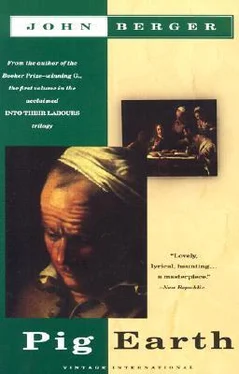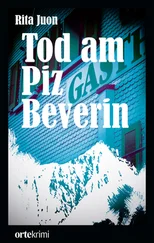Many times that summer I was tempted in the evenings to climb up to the alpage to discover whether or not she was pregnant. Each time I told myself it was better not. And so I stayed below in suspense. Finally, late in August, I saw her outside the church at a wedding and, to my great relief, she did not single me out in any way.
After I had been in Paris for two winters, Marius à Brine fell sick. It was the month of July and I was back in the village. La Mélanie sat by her husband’s bed, lending him what courage she could, and the Cocadrille climbed up to the alpage to fetch ice to lay on his burning stomach. There is a cave there, near the horseshoe of rocks where the four of us were going to sing, into which the sun never penetrates. She filled a can with this broken ice, covered it with a shawl, and ran back all the way down to Brine. It was the same path I ran down that first night when I fled from the goats. By the time she arrived, more than half the ice had melted and there were only rounded slivers left to put on his pain-clenched stomach. She made three such journeys up to the cave, and when she came back the third time, in the mid-afternoon, Marius was dead.
I went to pay my last respects to him. He was laid out in his black suit and boots. At the foot of the bed the Cabrol family kept vigil. The Cocadrille was wearing a widow’s dress like her mother and her face was inclined and invisible. I made the sign of the cross with the sprig of boxwood over his still heart and his head with its closed eyes. Edmond, his youngest son, was only three years old.
Food and drink were laid out for the visitors. The Cocadrille left the room of the dead and came out to offer me some apple rissoles. As I ate, she looked up at me. In her drawn, tearstained face, framed in black, her blue eyes were even more intense than I recollected. In April the first forget-me-nots appear in the grass, like flakes fallen from the sky. Dug up with their roots and brought inside the house they bring fine weather with them. Her eyes were the same blue.
So you are leaving us again? she said.
Yes. Not just for Paris, I’m going to South America.
Come back before you die, she said in her deep voice.
Her saying this angered me. I offered my condolences once more and left. After her father’s death the Cocadrille continued to work on the farm.
In 1936 Emile died as the final consequence of his war wounds. Two years later La Mélanie followed her husband and her eldest son into the grave. Henri married Marie, a woman from the next village. The Cocadrille milked the cows, looked after the stable, grew the vegetables, collected wood, grazed the cattle. Marie, her sister-in-law, complained about her:
She’s as dirty as a chicken house. And she never lifts a finger in the kitchen. What sort of woman is that?
The years passed. The Second War broke out.
One morning the Cocadrille was scything between the apple trees with her own scythe which she would never allow anyone else to touch. Over the years its blade had been worn down by whetting and beating until it was scarcely wider than a thumbnail. If you gave me the money, I could never buy another like this, she said. Only the work of twenty summers can make a scythe as light as this. For twenty summers I’ve cherished this scythe like a son. She was by now known for her original way of talking.
The air was still cooler than the earth under the grass. Far above the orchard, the forest was not yet in the full light of day. Looking up, the Cocadrille saw two men beckoning her from the edge of the trees. Her brothers noticed that she had stopped working and followed her gaze. The two strangers at the edge of the forest must have seen what they took to be a child and two peasants in a hayfield pointing towards them. This was in 1944.
Shit! said Henri.
They’re maquisards, said Edmond, who was now as large as a man and already had a knowing expression.
What else could they be? grumbled Henri.
Jésus! don’t let anyone else see them.
The Cocadrille pretended to have noticed nothing. It was always Edmond who spoke and Henri who waited, and then it was Henri who prided himself on his cunning.
Marie can give them food and they can go, said Henri after a long pause.
One of the two unknown men started down the slope. Half-way, he emerged from the shadow of the mountain and entered the early morning sunshine. He was short and burly and walked like a peasant.
The two brothers stood absolutely still lest any movement be interpreted by the stranger as a welcome. When he was a few metres away, the stranger said, Good morning.
In the fields deliberate silence is a powerful weapon. Henri said nothing, and withdrew his head back into his shoulders like a dog guarding a doorway. Edmond stood with his hands on his hips, staring insolently.
Two of us need shelter for twenty-four hours, announced the stranger, after allowing the silence to continue long enough to show that he had recognised it.
Who told you to come to our farm?
Nobody. We know who not to go to.
In God’s name! muttered Henri. He took out his scythe stone and began sharpening the blade. The noise of the stone on the metal, like the previous silence, was intended to indicate a further refusal to answer.
The stranger strolled over towards the small figure who was still scything between the apple trees.
Good morning, little girl, he said to the Cocadrille.
She turned towards him and he saw that she was a middle-aged woman with a lined face, old enough to be his mother.
I didn’t see … he excused himself.
This is also my farm, she said.
The stranger made a sign to his companion up by the forest. The second man was limping and carried a gun in each hand.
The two brothers, anxious to prevent the Cocadrille talking to the maquisard, came over to the apple trees.
Where are you from? Edmond asked.
I’m from the Dranse. The SS burnt down my father’s farm there.
So you have nothing to lose? remarked Edmond.
Nothing.
The single word contained a threat. This time the silence was filled only with the gasp of the Cocadrille’s scythe as it cut the grass.
We’ll give you food and after that you must go, announced Henri.
No, we need to stay till tomorrow.
The man who limped and carried the guns joined them. He was young and his unshaven face looked worn and pain-filled.
The best way to hide, said Henri slyly, is to work with us. We need to get the hay in.
The comrade here has a wound that needs dressing, said the peasant from the Dranse.
We are not a hospital!
The Cocadrille leant on her scythe and looked across at the young man. Where is your wound? she asked.
The right thigh, he said.
I will dress it for you.
And if the Germans come? Henri yelled. He can’t be in the house.
You are right, interrupted the peasant from the Dranse. It’s better if we stay up here.
You mean the Germans are looking for you? said Edmond quickly.
Probably.
You came here with a wounded man and with the Germans on your heels and you expect us to risk our lives saving you!
They could hide in the chicken house.
No, we are safer, like you said, working with you. We are your cousins come to help with the hay. Is there anyone down there in the house?
My wife.
So you are four.
With the Cocadrille here, yes.
Can you, Madame, fetch hot water and bandages? Meanwhile we’ll hide the weapons.
When she returned from the farm with some strips of linen sheet, she led the wounded man to a flat step of ground by the side of the stream which her grandfather had used to drive the saw. The wound near the top of his thigh was like a wound of any generation.
She knelt in her black dress by his hips and bent over the wound whilst she bathed it with hot water. It took her a long time to get the old dressing completely off. The wound was as red as beef. She diluted some gnôle and dabbed it on the wound. When it hurt him, his hand, lying on the grass, found her calf and gripped it through her dress.
Читать дальше












